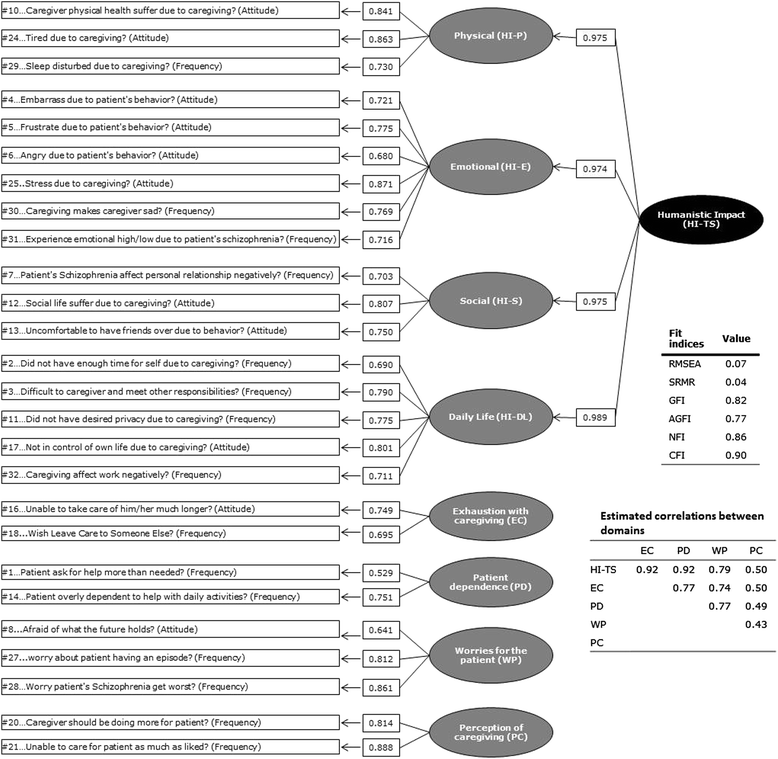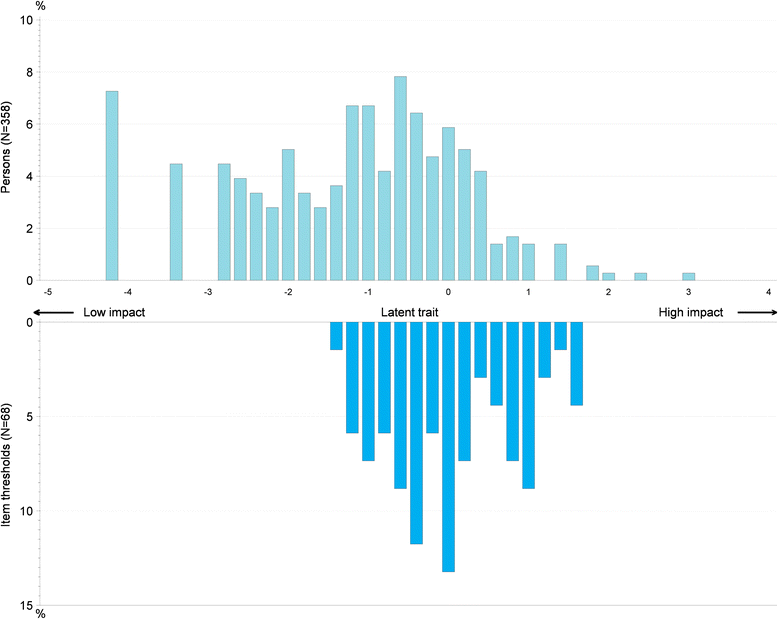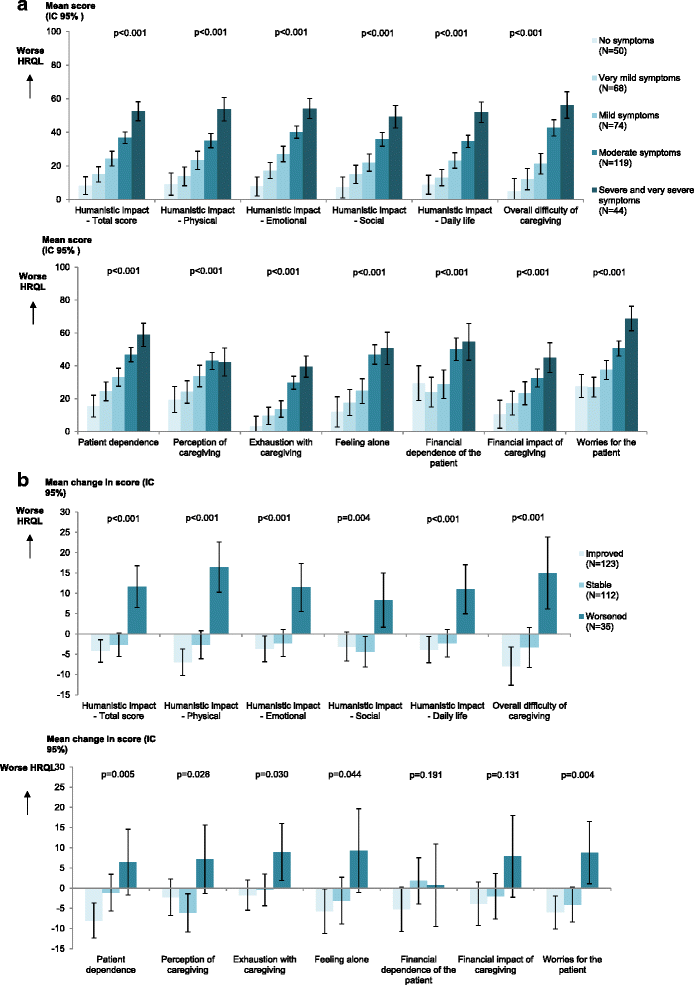Assessing the impact on caregivers of patients with schizophrenia: psychometric validation of the Schizophrenia Caregiver Questionnaire (SCQ)
- PMID: 27431493
- PMCID: PMC4950699
- DOI: 10.1186/s12888-016-0951-1
Assessing the impact on caregivers of patients with schizophrenia: psychometric validation of the Schizophrenia Caregiver Questionnaire (SCQ)
Abstract
Background: The Schizophrenia Caregiver Questionnaire (SCQ) was developed to assess the impact on caregivers of caring for patients with schizophrenia. The objective of this study was to develop a scoring algorithm for the SCQ, and evaluate its measurement properties.
Methods: The SCQ was administered to 358 caregivers of patients with schizophrenia included in the observational PATTERN study of stabilized patients with persistent symptoms of schizophrenia receiving outpatient care. SCQ item selection and creation of scores were based on exploration of item response distribution, factor analyses, and Rasch model. Construct validity, reliability, and ability to detect change of the SCQ scores were investigated.
Results: The final questionnaire comprised a 'Humanistic impact' supra-domain composed of a global score and four subdomain scores ('Physical'; 'Emotional'; 'Social'; 'Daily life'), and eight other domain scores related to the caregiving role ('Exhaustion with caregiving'; 'Feeling alone'; 'Patient Dependence'; 'Worries for the patient'; 'Perception of caregiving'; 'Financial dependence of the patient'; 'Financial impact of caregiving'; 'Overall difficulty of caregiving'). Two items from the SCQ were deleted. SCQ scores showed very good construct validity: Item convergent/discriminant validity were satisfactory; SCQ scores of caregivers of patients with more severe symptoms were higher indicating more impact (p < 0.05 for all scores); SCQ scores were meaningfully associated with measures of schizophrenia severity (PANSS and PSP) and caregivers' Health-Related Quality of Life (Medical Outcome Survey Short Form 36 items). The SCQ Humanistic impact supra-domain scores demonstrated very good internal consistency reliability (Cronbach's alphas between 0.80 and 0.96) and test-retest reliability (Intraclass Coefficient correlations ranging from 0.75 and 0.87); Other SCQ domain scores showed lower but still acceptable reliability coefficients. SCQ scores clearly increased for caregivers of patients whose schizophrenia worsened.
Conclusions: Overall, the 30-item SCQ demonstrated very good measurement properties supporting its relevance to comprehensively measure the experience of caregivers of patients with schizophrenia.
Keywords: Caregiver; Impact; Quality of life; Questionnaires; Schizophrenia; Validation.
Figures



Similar articles
-
[A preliminary validation of a new French instrument to assess quality of life for caregivers of patients suffering from schizophrenia].Encephale. 2011 Dec;37(6):425-32. doi: 10.1016/j.encep.2011.01.005. Epub 2011 Jul 8. Encephale. 2011. PMID: 22137214 French.
-
Impact of Alzheimer's Disease on Caregiver Questionnaire: internal consistency, convergent validity, and test-retest reliability of a new measure for assessing caregiver burden.Health Qual Life Outcomes. 2014 Sep 4;12:114. doi: 10.1186/s12955-014-0114-3. Health Qual Life Outcomes. 2014. PMID: 25186634 Free PMC article.
-
Validity and reliability of short forms of parental-caregiver perception and family impact scale in a Telugu speaking population of India.Health Qual Life Outcomes. 2016 Mar 1;14:34. doi: 10.1186/s12955-016-0433-7. Health Qual Life Outcomes. 2016. PMID: 26932786 Free PMC article.
-
[Caregiver burden in relatives of persons with schizophrenia: an overview of measure instruments].Encephale. 2003 Mar-Apr;29(2):137-47. Encephale. 2003. PMID: 14567165 Review. French.
-
Development and psychometric properties of surveys to assess patient and family caregiver experience with care transitions.BMC Health Serv Res. 2021 Aug 9;21(1):785. doi: 10.1186/s12913-021-06766-w. BMC Health Serv Res. 2021. PMID: 34372847 Free PMC article. Review.
Cited by
-
Insomnia and caregiver burden in chronic pain patients: A cross-sectional clinical study.PLoS One. 2020 Apr 2;15(4):e0230933. doi: 10.1371/journal.pone.0230933. eCollection 2020. PLoS One. 2020. PMID: 32240225 Free PMC article.
-
Perceived Burdens and Educational Needs of Caregivers of People with Schizophrenia: Results of a National Survey Study.Patient Prefer Adherence. 2022 Jan 21;16:159-168. doi: 10.2147/PPA.S326290. eCollection 2022. Patient Prefer Adherence. 2022. PMID: 35087268 Free PMC article.
-
Quality of life and its social determinants for patients with schizophrenia and family caregivers in Cambodia.PLoS One. 2020 Mar 4;15(3):e0229643. doi: 10.1371/journal.pone.0229643. eCollection 2020. PLoS One. 2020. PMID: 32130240 Free PMC article.
-
Translation and validation of the Schizophrenia Caregiver Questionnaire - Japanese version (J-SCQ).Heliyon. 2023 Jan 31;9(2):e13338. doi: 10.1016/j.heliyon.2023.e13338. eCollection 2023 Feb. Heliyon. 2023. PMID: 36816236 Free PMC article.
-
Self-Report Measures Assessing Aspects of Personal Recovery in Relatives and Other Informal Carers of Those With Psychosis: A Systematic Review.Front Psychol. 2022 Jul 15;13:926981. doi: 10.3389/fpsyg.2022.926981. eCollection 2022. Front Psychol. 2022. PMID: 35911034 Free PMC article.
References
Publication types
MeSH terms
LinkOut - more resources
Full Text Sources
Other Literature Sources
Medical
Miscellaneous

